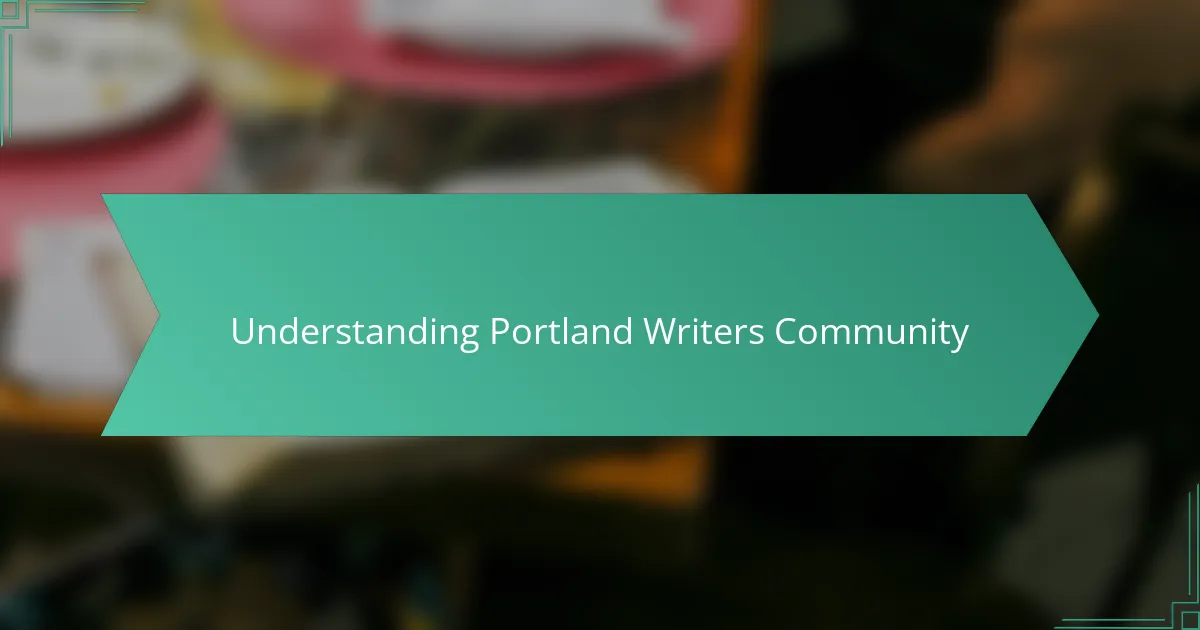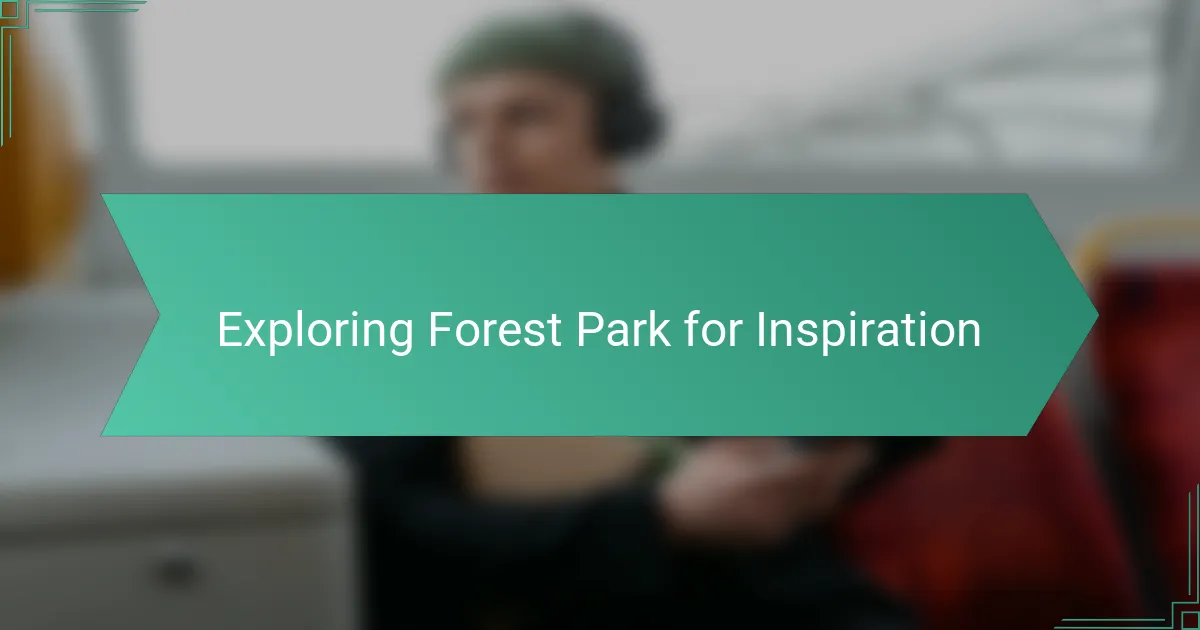Key takeaways
- Portland’s writing community fosters genuine support, making the writing journey a shared adventure filled with encouragement and honest feedback.
- Connecting with nature, especially in places like Forest Park, can inspire creativity and help clear mental clutter, allowing fresh ideas to emerge.
- Developing your unique writing voice involves regular practice, embracing imperfection, and receiving constructive feedback from trusted readers.
- Maintaining a consistent writing routine and staying connected with fellow writers helps sustain motivation and accountability in the creative process.

Understanding Portland Writers Community
Portland’s writing community feels like a close-knit family, one that welcomes you with open arms and shared stories. I often find myself wondering, what makes this group so special? For me, it’s their genuine support and the way they celebrate both struggles and successes alike.
When I first started sharing my work here, I was surprised by the honest feedback and encouragement I received. It wasn’t just about improving my craft but also about connecting with others who understand the rollercoaster of being a writer. Have you ever experienced a group that truly listens to your creative voice?
This community reminds me daily that writing is not a solitary journey but a shared adventure. The diverse voices and experiences in Portland inspire me to keep exploring my own, showing me that every story is worth telling.

Benefits of Joining Local Writing Groups
Joining a local writing group gave me something I didn’t realize I was missing: a consistent space where my words mattered. Have you ever felt that nervous excitement just before reading your work aloud? That mix of vulnerability and hope is made sweeter when surrounded by writers who truly get it.
The honest feedback I received wasn’t just critique—it was a gift that helped me see my stories through fresh eyes. When someone points out what moves them or where a phrase falls flat, it sparks a kind of creative momentum I hadn’t tapped into before. It’s like having a compass on the sometimes foggy path of finding your unique voice.
But beyond craft, the emotional boost from these groups can’t be overstated. There were times when self-doubt crept in, and sharing my struggles among fellow writers turned isolation into connection. Doesn’t it feel reassuring to know you’re not alone in this creative pursuit? That reassurance fuels perseverance in a way I value deeply.

Exploring Forest Park for Inspiration
Walking through Forest Park, I quickly realized it wasn’t just the towering trees or the soft crunch of leaves that stirred something inside me—it was the quiet invitation to pause and listen. Have you ever noticed how nature seems to slow down your thoughts, making space for new ideas to surface? For me, those moments amid the moss-covered trees became a wellspring of unexpected inspiration.
One afternoon, as sunlight filtered through the canopy, a sudden image of a story character popped into my mind. It surprised me how the solitude and natural rhythms in the park cleared the clutter in my head. I found myself scribbling notes on a makeshift journal, capturing ideas that felt more vivid than anything I’d conjured inside my usual writing nook.
What’s remarkable about Forest Park is how it invites you to explore not just the trails but your own creativity with fresh eyes. Each turn seemed to offer a new perspective or metaphor I hadn’t considered before. Isn’t it fascinating how a simple walk can unlock doors in your imagination you didn’t even know were closed?

Techniques to Develop Your Writing Voice
Finding your writing voice often starts with a simple but powerful practice: writing regularly without overthinking it. Have you ever caught yourself stuck, trying to sound like someone else instead of your true self? When I let go of that pressure, my words began to flow more naturally, revealing the unique rhythm and tone that felt authentically mine.
Reading widely and diversely also shaped my voice in ways I didn’t expect. By immersing myself in different styles—from poetry to essays—I learned what resonated with me emotionally and stylistically. It made me ask, which voices inspire me, and why? Reflecting on those questions helped me blend influences into something new that felt like me.
Another technique that transformed my voice was sharing drafts with trusted readers and listening deeply to their reactions. When someone highlights a phrase that moves them or points out where my authenticity wavered, it feels like a mirror reflecting my true self back at me. Doesn’t that kind of feedback give writing an intimate, almost collaborative heartbeat? For me, that ongoing dialogue has been essential in honing a voice that stands out yet stays honest.

Applying Nature to Enhance Creativity
There’s something deeply grounding about letting nature seep into your creative process. When I write after a walk in Forest Park, I notice how my ideas loosen up and take unexpected shapes, almost as if the trees themselves whisper new possibilities. Have you ever felt how stepping outside can unclog your mind and let fresh stories find their way?
I remember one afternoon when I sat by a quiet stream, notebook in hand, and felt my scattered thoughts settle like leaves drifting on water. That peaceful, natural rhythm seemed to sync with my own, allowing words to flow with a clarity I rarely achieve indoors. Isn’t it amazing how nature’s calm can sharpen the creative edge you didn’t know you had?
Incorporating these moments outdoors has become more than a habit—it’s a creative reset button. Whenever I’m stuck or overwhelmed, a short hike through Forest Park invites me to breathe deeply, look around, and listen—to both the forest and my inner voice. Maybe you’ve noticed how nature’s simple presence encourages your pen to dance across the page in ways nothing else can.

Personal Journey Finding Writing Voice
Finding my writing voice felt like uncovering a hidden part of myself I hadn’t met before. I remember sitting on a mossy rock in Forest Park, feeling the damp earth beneath me, and suddenly realizing my words could carry the same quiet strength as the quiet woods around me. Have you ever experienced a moment where the environment suddenly seems to echo what you’ve been trying to say all along?
There were days when doubt clouded my mind, and I wondered if my voice was too ordinary or lost among so many others. Yet, each time I returned to the trails, breathing in the peacefulness, the doubts softened, and my true tone began to emerge—less forced, more authentic. Isn’t it curious how getting away from noise and distraction can bring you closer to your own story?
The journey wasn’t just about technique but about patience and trust. Writing in Forest Park taught me to listen—to the rustle of leaves and the stirrings of my own heart—and that listening translated into a voice that felt honest and alive. How often do we give ourselves permission to just be still and let our words find us? For me, that was the turning point.

Tips for Sustaining Your Writing Practice
One habit that has kept my writing alive is setting a regular time each day to write, even if it’s just for ten minutes. Have you ever noticed how a consistent routine can make creativity feel less like a chore and more like a natural part of your day? I found that treating writing as a daily meeting with myself made it easier to show up, no matter the mood.
Another tip I hold close is to embrace imperfection early on. When I first started, I would freeze, worried about every word being perfect. Over time, I learned to let my drafts be messy, knowing that editing would come later. Isn’t it freeing to give yourself permission to write badly at first? That freedom keeps the momentum going and the ideas flowing.
Lastly, staying connected with fellow writers has been crucial for me. Sharing struggles and small wins within our community creates a kind of accountability that keeps me motivated. Have you ever felt how a simple check-in or encouragement can light a creative spark on a tough day? For me, those connections are the threads that sustain my writing practice over time.